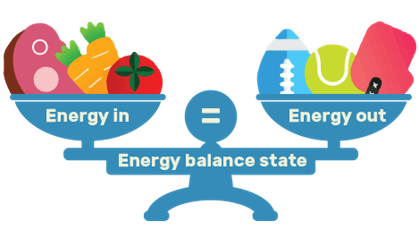
Energy Balance in Young Athletes: Why It Matters and How to Get It Right
Introduction
Energy balance is crucial for young athletes. It refers to the relationship between the energy consumed through food and the energy expended through activity and normal daily functions. Maintaining a healthy energy balance supports growth, athletic performance, and overall health.
Why Energy Balance is Important
Young athletes need sufficient energy not only to fuel their training but also to support their growing bodies. Without enough calories, they may experience:
- Fatigue: Lack of energy can lead to sluggish performance and tiredness during training and competitions.
- Poor Growth: Athletes may fail to meet growth milestones, affecting their height, muscle mass, and bone health.
- Increased Injury Risk: Inadequate energy intake can weaken the body’s recovery systems, making athletes more prone to injury, especially overuse injuries.
- Reduced Performance: Not getting enough calories means athletes won’t be able to perform at their best and recover adequately before the next activity, whether in endurance sports or strength-based activities.
Signs of Energy Deficiency
Parents, coaches, and athletes should look out for:
- Unexplained fatigue
- Frequent illness or injuries
- Difficulty maintaining a healthy weight
- Decreased concentration and performance in sports and school
How to Achieve Energy Balance
Eat Enough Calories
Young athletes should eat enough to match their energy expenditure. This includes both calories burned during training and calories needed for daily bodily functions and growth. A registered sports nutritionist can help estimate caloric needs based on activity levels and individual growth rates.
Macronutrient Balance
It’s essential that calories come from a balance of carbohydrates (the primary fuel), proteins (for muscle repair), and fats (for sustained energy). Carbohydrates should make up a large part of an athlete's diet, especially on high-intensity training days.
Regular Meals and Snacks
Young athletes should eat regularly, including 3 main meals and 2-3 snacks throughout the day. This ensures that they consistently replenish energy stores and avoid large energy deficits.
Post-Workout Nutrition
After intense exercise, eat a snack containing carbohydrate and protein, within the first 30 minutes, like a peanut butter sandwich. Then follow this up with a balanced meal, that prioritises carbohydrate (grains) and protein (fish or meat), to replenish glycogen stores and support muscle recovery.
Hydration
Energy balance isn’t just about food, it includes fluids too. Dehydration can sap energy and reduce performance. Encourage athletes to drink water throughout the day and supplement this with either a small snack for energy, like a banana or a sports drinks, during long-duration or high-intensity workouts.
Managing Energy Balance for Different Sports
- Endurance athletes (e.g., runners, swimmers) require a balance of fats and carbohydrates to fuel long-duration activities.
- Team sports (e.g., hockey, football) are intermittent in nature and such, athletes will require carbohydrate to fuel their repetitive short bursts and protein for muscle recovery.
Final Thoughts
Maintaining energy balance is essential for young athletes’ performance, health, and development. By focusing on proper nutrition, sufficient calories, balanced macronutrients, and regular meals they can achieve their athletic goals while supporting their long-term well-being.
